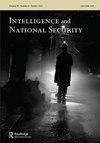The intelligence politics of early congressional oversight of CIA
IF 0.8
3区 社会学
Q1 HISTORY
引用次数: 1
Abstract
ABSTRACT This paper offers an alternative to the conventional wisdom about early congressional oversight of the CIA. It focuses on congressional structures, how they influenced the development of intelligence oversight, the intelligence politics that grew out of these structures and the growth in congressional interest in CIA’s analysis and collection. Moving beyond questions about whether intelligence oversight was sufficient, this paper shows how CIA analysis and collection became an input for legislative decision-making through oversight and highlights the key role congressional staff played in overseeing the CIA. It also examines how Congress used Agency information to check or support the executive branch, as well as how the executive branch influenced congressional oversight development.早期国会对中央情报局监督的情报政治
摘要本文为早期国会对中央情报局的监督提供了一种替代传统智慧的方法。它关注的是国会结构,它们如何影响情报监督的发展,从这些结构中产生的情报政治,以及国会对中情局分析和收集的兴趣的增长。除了情报监督是否充分的问题之外,本文还展示了中央情报局的分析和收集是如何通过监督成为立法决策的投入的,并强调了国会工作人员在监督中央情报局方面发挥的关键作用。它还研究了国会如何利用机构信息来检查或支持行政部门,以及行政部门如何影响国会监督的发展。
本文章由计算机程序翻译,如有差异,请以英文原文为准。
求助全文
约1分钟内获得全文
求助全文
来源期刊

Intelligence and National Security
Multiple-
CiteScore
1.80
自引率
41.70%
发文量
93
期刊介绍:
Intelligence has never played a more prominent role in international politics than it does now in the early years of the twenty-first century. National intelligence services are larger than ever, and they are more transparent in their activities in the policy making of democratic nations. Intelligence and National Security is widely regarded as the world''s leading scholarly journal focused on the role of intelligence and secretive agencies in international relations. It examines this aspect of national security from a variety of perspectives and academic disciplines, with insightful articles research and written by leading experts based around the globe. Among the topics covered in the journal are: • the historical development of intelligence agencies • representations of intelligence in popular culture • public understandings and expectations related to intelligence • intelligence and ethics • intelligence collection and analysis • covert action and counterintelligence • privacy and intelligence accountability • the outsourcing of intelligence operations • the role of politics in intelligence activities • international intelligence cooperation and burden-sharing • the relationships among intelligence agencies, military organizations, and civilian policy departments. Authors for Intelligence and National Security come from a range of disciplines, including international affairs, history, sociology, political science, law, anthropology, philosophy, medicine, statistics, psychology, bio-sciences, and mathematics. These perspectives are regularly augmented by research submitted from current and former intelligence practitioners in several different nations. Each issue features a rich menu of articles about the uses (and occasional misuses) of intelligence, supplemented from time to time with special forums on current intelligence issues and interviews with leading intelligence officials.
 求助内容:
求助内容: 应助结果提醒方式:
应助结果提醒方式:


